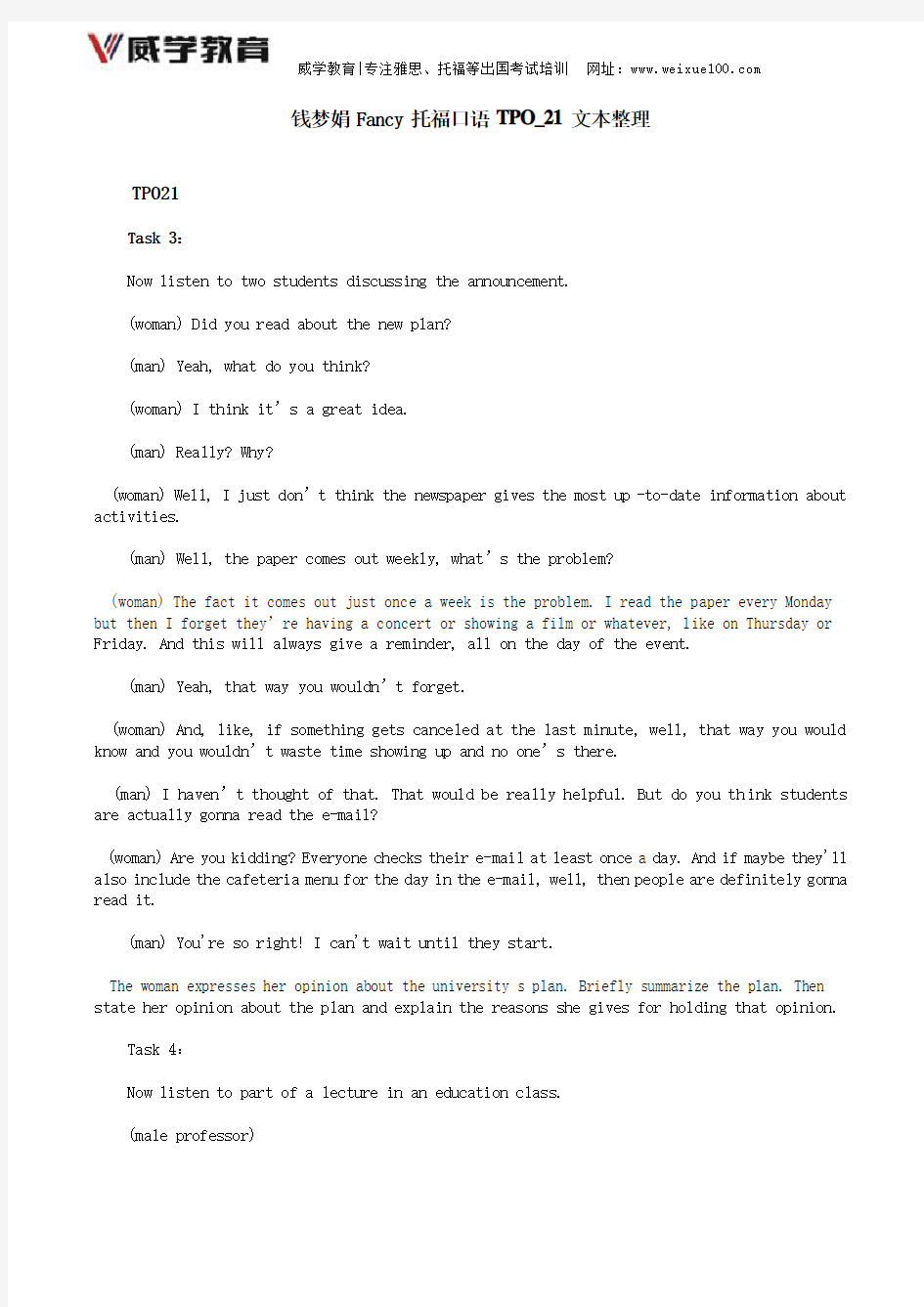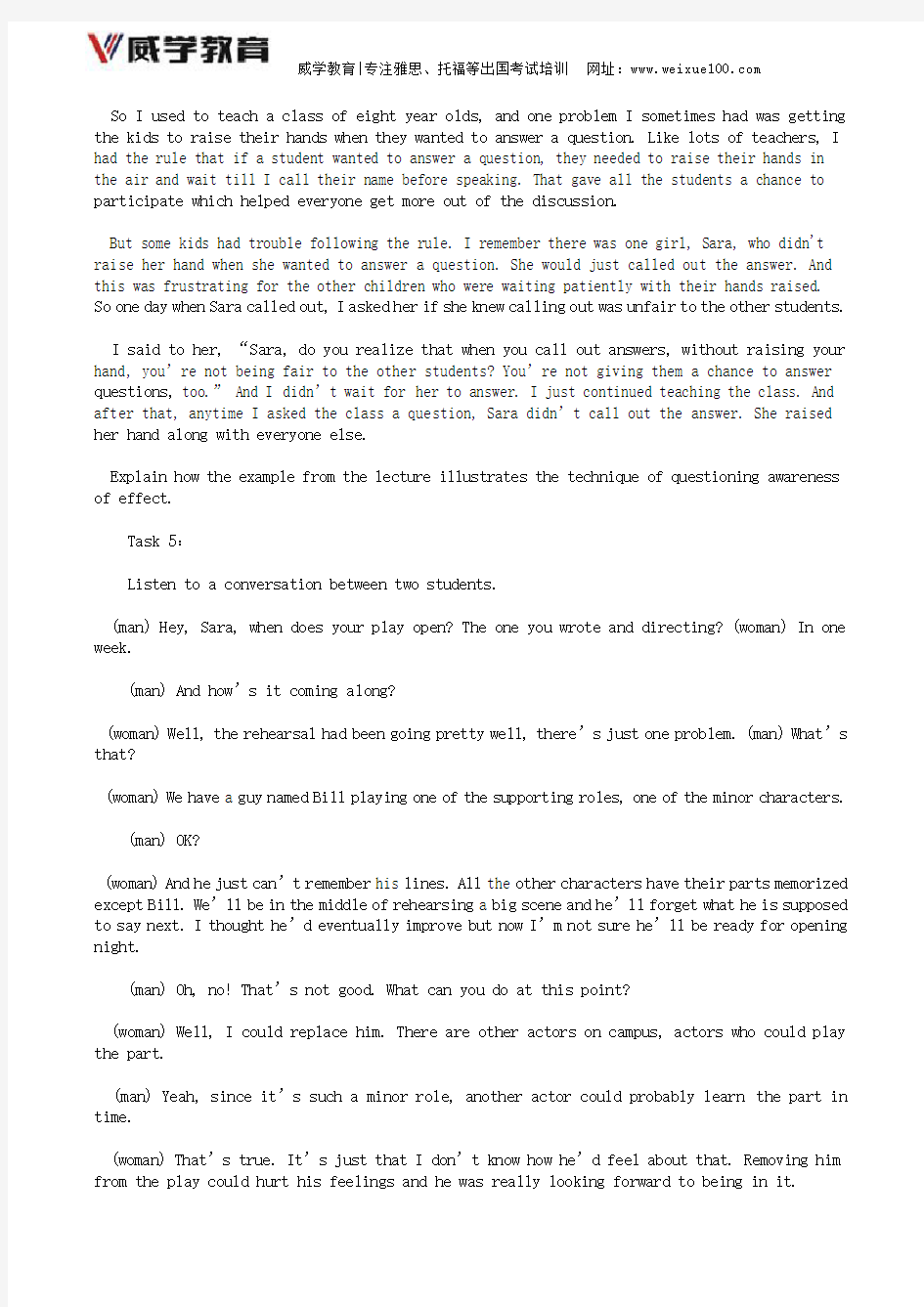【威学教育】Fancy托福口语TPO-21听力文本


TPO21
Task 3:
Now listen to two students discussing the announcement.
(woman) Did you read about the new plan?
(man) Yeah, what do you think?
(woman) I think it’s a great idea.
(man) Really? Why?
(woman) Well, I just don’t think the newspaper gives the most up-to-date information about activities.
(man) Well, the paper comes out weekly, what’s the problem?
(woman) The fact it comes out just once a week is the problem. I read the paper every Monday but then I forget they’re having a concert or showing a film or whatever, like on Thursday or Friday. And this will always give a reminder, all on the day of the event.
(man) Yeah, that way you wouldn’t forget.
(woman) And, like, if something gets canceled at the last minute, well, that way you would know and you wouldn’t waste time showing up and no one’s there.
(man) I haven’t thought of that. That would be really helpful. But do you th ink students are actually gonna read the e-mail?
(woman) Are you kidding? Everyone checks their e-mail at least once a day. And if maybe they'll also include the cafeteria menu for the day in the e-mail, well, then people are definitely gonna read it.
(man) You're so right! I can't wait until they start.
The woman expresses her opinion about the university s plan. Briefly summarize the plan. Then state her opinion about the plan and explain the reasons she gives for holding that opinion.
Task 4:
Now listen to part of a lecture in an education class.
(male professor)
So I used to teach a class of eight year olds, and one problem I sometimes had was getting the kids to raise their hands when they wanted to answer a question. Like lots of teachers, I had the rule that if a student wanted to answer a question, they needed to raise their hands in the air and wait till I call their name before speaking. That gave all the students a chance to participate which helped everyone get more out of the discussion.
But some kids had trouble following the rule. I remember there was one girl, Sara, who didn't raise her hand when she wanted to answer a question. She would just called out the answer. And this was frustrating for the other children who were waiting patiently with their hands raised. So one day when Sara called out, I asked her if she knew calling out was unfair to the other students.
I said to her, “Sara, do you realize that when you call out answers, without raising your hand, you’re not being fair to the other students? You’re not giving them a chance to answer ques tions, too.” And I didn’t wait for her to answer. I just continued teaching the class. And after that, anytime I asked the class a question, Sara didn’t call out the answer. She raised her hand along with everyone else.
Explain how the example from the lecture illustrates the technique of questioning awareness of effect.
Task 5:
Listen to a conversation between two students.
(man) Hey, Sara, when does your play open? The one you wrote and directing? (woman) In one week.
(man) And how’s it coming a long?
(woman) Well, the rehearsal had been going pretty well, there’s just one problem. (man) What’s that?
(woman) We have a guy named Bill playing one of the supporting roles, one of the minor characters.
(man) OK?
(woman) And he just can’t rememb er his lines. All the other characters have their parts memorized except Bill. We’ll be in the middle of rehearsing a big scene and he’ll forget what he is supposed to say next. I thought he’d eventually improve but now I’m not sure he’ll be ready for open ing night.
(man) Oh, no! That’s not good. What can you do at this point?
(woman) Well, I could replace him. There are other actors on campus, actors who could play the part.
(man) Yeah, since it’s such a minor role, another actor could probably learn the part in time.
(woman) That’s true. It’s just that I don’t know how he’d feel about that. Removing him from the play could hurt his feelings and he was really looking forward to being in it.
(man) I see, well, could you, I mean, maybe another thing you could do is spent time with him, after rehearsals, you know, work with him to help him learn to remember his lines.
(woman) Yeah, I could do that. But there are other parts of the production I try to take care of after rehearsals. So it’ll take away from other things that I need to do before opening night.
Briefly summarize the problem the speakers are discussing. Then state which solution you would recommend. Explain the reasons for your recommendation.
Task 6:
Listen to a part of a lecture from a history class. The professor is talking about the Industrial Revolution.
(female professor)
Back in the18th century, in a time known as the Industrial Revolution, some countries, well, England in particular, started using new technology, like steam-powered machines to produce goods. And the use of these machines brought about some significant changes. Let’s go over two main changes that occurred.
One change was that the center of production moved from homes to factories. Um, let’s take fabric, or cloth, as an example. Historically, for a very long time, people had made cloth by hand in their homes, earning a little money from their home-based cloth production. But then these new steam-powered machines for weaving cloth were invented and placed in factories, and these machines could weave cloth much more quickly and efficiently. So there wasn’t any reason to keep making cloth slowly in homes when it could be made faster on factory machines. Thus the majority of cloth productions shifted from home-based businesses to factory production.
Another result of the new technology is that cities started forming around factories, like let's say there was a cloth factory that was built in a certain small village. Now, of course, the factory needed workers to operate the machines used in cloth
production. So the factory would hire a lot of rural workers who would then move from the country side to the village. So instead of spreading all over the country side, the workers started to congregate in the village with the factory. As a result, the village got bigger and bigger and eventually grew to a city.
Using points and examples from the talk, describe two changes that occurred after machines began to be used for manufacturing goods.
